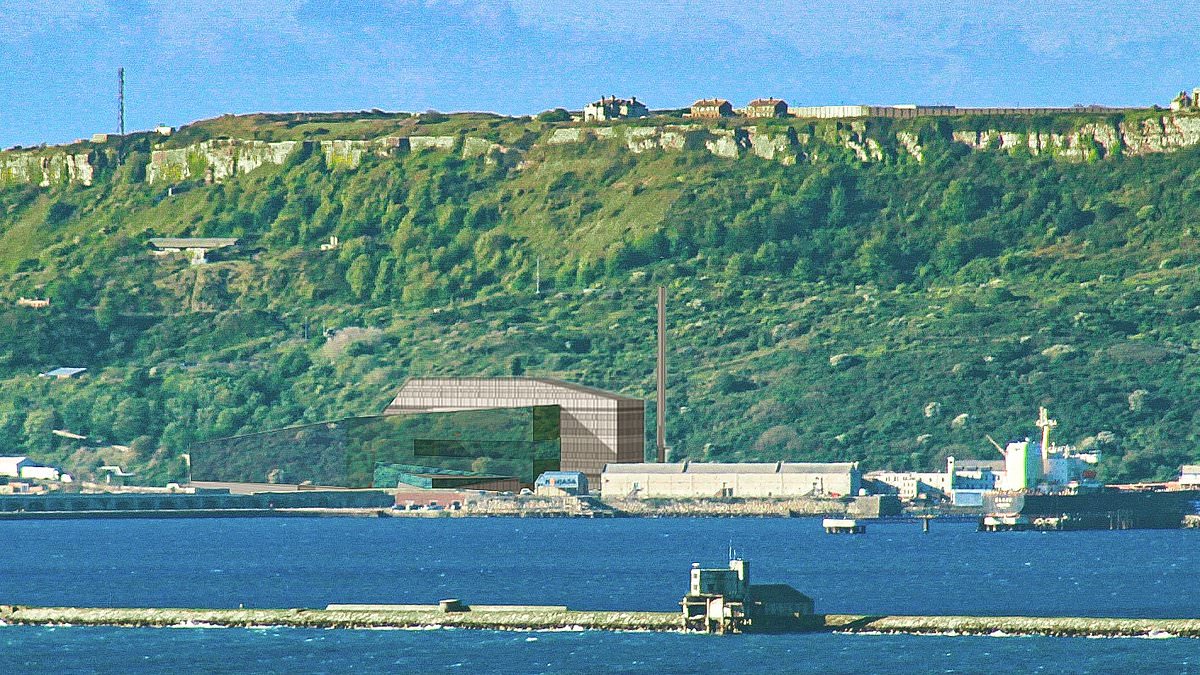A huge waste incinerator to be built on Britain’s Jurassic Coast will threaten its prestigious World Heritage status, campaigners have warned.
The government decision to approve the 264ft tall chimney stack in Britain’s only natural World Heritage Site on the Isle of Portland, Dorset, has been slammed as ‘deeply deplorable’ and ‘mad’.
The incinerator, which will burn commercial, household and skip waste 24 hours a day, could see the Jurassic Coast being put on UNESCO’s ‘World Heritage in Danger’ list.
According to the UNESCO website, threats that could have ‘deleterious effects’ on the character of a World Heritage Site include human development projects.
The main building for the incinerator will be bigger than Westminster Abbey while the chimney stack will be nearly twice the height of Portland Bill lighthouse.
The plans had been unanimously rejected by Dorset Council amid fierce opposition from local residents, MPs, and organisations concerned about the impact on the UNESCO site.
But developers Powerfuel Portland appealed the decision to refuse it permission.
Rushanara Ali, a junior minister has overturned the decision on behalf of the Secretary of State for Building Safety and Homelessness.
Ms Ali said the £150million incinerator would not appear out of place or out of scale and would have ‘no injurious effect’ on the Jurassic Coast World Heritage Site.
But the UK government has now been warned by World Heritage Watch, an independent body that works with UNESCO to protect World Heritage Sites, that they need to go to UNESCO to get approval.
Stephan Doempke, chairman of World Heritage Watch, said: ‘World Heritage Watch finds the decision of UK government to grant planning permission for a waste incinerator in the immediate vicinity of a World Heritage Site deeply deplorable.
‘It sends the wrong message by giving short-term economic gains preference over long-term benefits for the people and nature of the Dorset coast.
‘The UK government should also be aware that a project of such magnitude and potential impact on a World Heritage site must be submitted to UNESCO’s World Heritage Committee for approval, and according to Section 172 of the operational guidelines for the implementation of the World Heritage Convention, the UK Government should avoid any decision that would be difficult to reverse.
‘We request the UK Government to fully meet this obligation they have under international law.’
According to the UNESCO website, threats that could have ‘deleterious effects’ on the character of a World Heritage Site include human development projects.
The 95-mile long stretch of coast in Dorset and Devon is the only place in the world where rocks from the Triassic, Jurassic and Cretaceous periods can be seen in one place, representing 185 million years of Earth’s history.
The Isle of Portland is not part of the World Heritage Site but sits in the middle of it.
Recent rockfalls on the coast have also increased fears about the future of the famous area.
But the possible installation of ‘unsightly’ barriers has been met with fierce opposition from experts.
Sam Scriven, from the Jurassic Coast Trust, said: ‘The Jurassic Coast Trust are very disappointed by the decision to grant permission to build the energy reclamation facility on Portland.
‘Although the development will lie outside of the Jurassic Coast World Heritage Site itself, there will be an impact to the site’s overall setting.
‘We will continue to advise Dorset Council and other stakeholders as needed on this matter, and carry on our work promote and conserve the outstanding Earth heritage of the Dorset and East Devon coast as a whole.’
In 2019 Dorset Council declared a ‘climate emergency’ and pledged to go carbon neutral by 2040. The government decision for the waste incinerator will kill that aim, it is claimed.
A spokesperson for the Stop Portland Waste Incinerator campaign group said: ‘It is beyond disappointing.
‘Here on the Jurassic Coast, England’s only natural world heritage coastline tells mankind that climate change is an existential matter.
‘Burning one tonne of waste emits one tonne of greenhouse gases. Building an incinerator at Portland Port and shipping waste here makes no sense at all.’
Nick Ireland, leader of Dorset Council, said: ‘This ignores the views of thousands of Dorset residents, who oppose the burning of waste on the Jurassic coastline for environmental, economic and health reasons.
‘Portland residents now face the prospect of a large-scale incinerator being built on their doorstep, in the middle of a UNESCO World Heritage site, with all the consequences that go along with it.
‘Do you want to sit on Weymouth beach and look at a power plant knowing that you might not be able to see the emissions but generally they will be heading your way because of the prevailing wind conditions.’
He also said he has instructed council officers to speak to a barrister and look into the possibility of bringing a judicial review over the decision.
Lloyd Hatton, the new Labour MP for South Dorset, said: ‘I’m deeply disappointed and frustrated with this decision. It’s a poorly thought out proposal in a far from ideal place.
‘I haven’t met a single person in my constituency who thinks it is a good idea. I firmly believe it is not the right idea I will do everything I can to oppose this.’
Dorset councillor Laura Beddow added: ‘I find it astonishing that this site over all others has been chosen. Where else can you name a Jurassic Coast? It’s mad.’
The plans were first unveiled in November 2019 but were met with fierce opposition and the application received more than 3,300 objections.
Powerfuel Portland claim the huge building will be ‘camouflaged’ using printed PVC mesh screening – a high resolution photograph of existing vegetation to create a ‘trompe-l’oeil’ effect, an optical illusion.
The firm said that the facility is consistent with national and local waste policy of harvesting energy recovery from waste, and will be capable of producing enough renewable low carbon energy to power around 30,000 homes.
